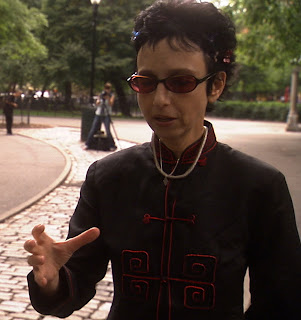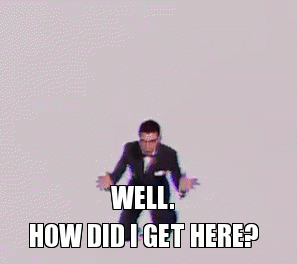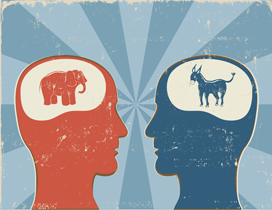less hospitable, and thus less ethical
How does this relate to democracy? Is there a utopian vision underlying this ethos? #naivereader
less hospitable, and thus less ethical
How does this relate to democracy? Is there a utopian vision underlying this ethos? #naivereader
Hayles presents a convincing argument in response to Manovich that neither database nor narrative will “win” but that they are “natural symbionts.”
Yes! Yes! The Great and Powerful Hayles!

The question becomes the following: How do we navigate the increasingly complex relationship between database and narrative as the amount of data increases?
Love this question--one of ongoing and increasing importance. Also, how tenable is this divide? Is it binary?
Ethical programs are processes (sometimes enacted in the form of software, but sometimes not) that determine the shape of networked infrastructures.
Are these digital-specific? Can they be understood at an intersection of historical/technological moment?
The reliance on a standard mobile-phone keyboard (which is constrained by fingertip size) and the use of character constraints are just two such affordances, and though they seem obvious to us now such simple affordances make way for users to remake and repurpose technologies:
So this applies to Twitter, too? Other messaging/emailing platforms?
But the human user of software is not merely making decisions on her own. Rather, each networked rhetorical situation is informed, shaped, enabled, and constrained by, among other things, software.
software as intermediary/agent
For Derrida, any theorization of hospitality begins from a “non-dialectizable antinomy” between what he calls the Law of hospitality and the laws of hospitality.[4] This distinction can perhaps be best understood by considering one’s connection to the Internet. For Derrida, the Law of hospitality—which he also sometimes calls “absolute hospitality”—is that which is offered to an anonymous other, regardless of identity or name. In terms of digital networks, we can consider any network connection to be suggestive of this absolute Law of hospitality. I connect to the Internet, and I invite a multitude of others. I have, in connecting to the network, entered a hospitable space that welcomes many others. And yet, at the very moment that I extend this welcome, I immediately begin to filter arrivals. From firewall software to the users that I block from viewing my Twitter feed, I find ways to sift and sort those that arrive at “my doorstep.” These filters are the laws of hospitality that respond to the Law. These laws are particular responses to particular others, and from the very start they are dependent upon exclusion. The laws of hospitality must always be both hospitable and inhospitable, simultaneously welcoming and excluding.
Defines Derridean hospitality and applies to the web context. To what extent does the user have agency? Who/what else operates on the user's behalf?
In this case, a spam message arrived unexpectedly,

Collin Brooke
More about Collin Brooke and his work here.
Kevin Brock’s dissertation “Engaging the Action-Oriented Nature of Computation: Towards a Rhetorical Code Studies”
Available here
the Essjay controversy
The Essjay Controversy--according to Wikipedia
more hospitable
As a lit guy, I'm thinking about notions of open/closed text here.
procedural rhetoric
The MediaWiki overview of "procedural rhetoric"
networked life is confined to our digital interactions
Avoid understanding networks as a digital phenomenon alone.
Robustness Principle
In layman's terms: Robustness Principle
RFC 761
Is this the document? RFC 761
Jacques Derrida calls the Law of hospitality
Jacques Derrida on hospitality
ethical programs
So "programs" in this context are not necessarily digital materials. Took me a while to catch that. What does it mean to understand programs broadly, as predigital entities?
electronic literature
For more, check out the Electronic Literature Collection
Lev Manovich
Francisco Varela
Learn more about Francisco Varela
Alexander Galloway
Read Galloway's blog
The Exploit
Carl Schmitt
Detailed overview of Carl Schmitt's work, courtesy of Stanford.

I might put in place filters, blocking the troll or unfriending a former high school classmate, but each of these filters happens only after I have entered a space of exposedness and response-ability, a space of hospitality.
Really interesting way of understanding social bonds online. I wonder about alleged censoring measures, like "unfollowing" someone on Facebook, but not "unfriending" them. We have the option to see less from certain friends, but can we stop others from seeing less from us (especially ex-girlfriends and parents?)?
packet switching
Wikipedia's explanation of packet switching
Avital Ronell
Learn more about Avital Ronell and her work.

Emmanuel Levinas’s essay “Substitution,”
Available here
Xbox Kinect camera
If you're like me, you have no idea what this is, so here you go:
Wendy Chun
Life in a network society
I'm wondering, How did we get here? Is this a Castells understanding of networks?
And, just because:

ITZPATRI
intellectual
"Intellectual"

CONSERVATIVES and liberals
